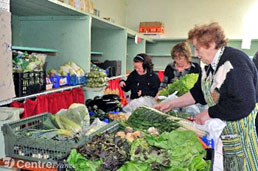|
Nine Surefire
Ways to Ruin Your
European Vacation continued . . .
- Plan too
many activities. "A packed schedule is one of the
premier ways to quickly destroy an otherwise great vacation," says
Bowers. "Of course, you want to see as much as you can. But
imagine if you applied the same approach to your birthday dinner at a
nice restaurant ~ you'd order the filet, AND the oysters, AND a spinach
salad, AND the shrimp cocktail, AND the baked brie, AND the stuffed
potato, AND the lobster tail, AND the molten chocolate cake, AND the
cheesecake, AND AND AND." Bowers admits that it is hard to
whittle down all your desires, but it's much more fulfilling to
experience a few things deeply that to whip through multiple places and
barely scratch the surface.
- Try to
cover too much distance. Sure, you can base yourself in
Rome and take day trips to Naples and Florence, but that's the
equivalent of basing yourself in New York City and doing a day trip to
Boston or Washington DC. You will
encounter traffic, delays, and problems, and creating an itinerary that
requires driving like a cross-country trucker is a self-defeating
exercise. Instead, pick an area, and give yourself the freedom to
explore it ~ to find a great coffee shop or a local artisan, to spend
more time at lunch, or to just sit with a drink and people
watch. "After all, if you wanted to be on a minute-to-minute,
demanding, frustrating schedule, you could have just gone to work,"
says Bowers.
- Hit all the "must-see" destinations. "Must-see"
destinations are always going to be chock full of tourists who are also
there because they must see
them. If you feel like you just can't live if you won't get to
see Le Mont St-Michel, go at dawn when no one else is there. Must see the David in
Florence? Go in January or February. "Just know that
popular sites are popular for a reason, and, therefore, will be highly
populated, " asserts Walker. "So think about going in the off-off
season; or perhaps pick one or two, and then find small town
alternatives to the bigger must see sights."
- "Just wing it" when it comes to meal
times. You don't have to plan every single meal in
advance, but if you're in a country like Italy, there can be a wide
disparity of food quality in restaurants, especially in the tourist
areas. Italy is all about food, and you'll be thanking yourself
for doing the research as you site down to a handmade, memorable,
locally-sourced meal rather than a plate of spaghetti and meatballs
(this dish is not typical Italian fare) in a restaurant with American
flags printed on the menu. [Editors note: French restaurant
food is usually quite authentically French, but remember that lunch
time in a restaurant begins about 11:30 and is over in about two or two
and a half hours. You can't walk in at 2PM and expect to
dine. In those instances, head for a brasserie which is
open all afternoon.] " You can search out a few 'destination
restaurants', make reservations from home, and get to know the culture
you are visiting through its food, "advises Bowers. "If you need
to 'wing it', head to local farm shops or markets or ask locals in a br
where they like to eat."
- Rack up debt on your trip.
What could possibly be more relaxing than penny-pinching your way
through a vacation, imagining how many hours you'll have to spend
working once you get home to pay it off? Save up the money you'll
need for a trip before you
go! "I can't stress this point strongly enough, "says
Walker. "Get a general idea of what things reasonably cost
before you go (e.g. food, lodging, gas) then make a budget. Save
the money, and stick to the budget. You don't have to count every
dollar, Europe or pound, just be aware that you are in the
ballpark. When you get home, if you've gone a bit over, it will
be by a few dollars (Eurasia, or pounds!). And you won't be
saddled
with thousands of dollars in debt to pay off for that 'restful'
vacation." [Editor's note: book and pay for rail
tickets and reserve rental cars in advance from home. You will
pay in your own currency and not be surprised in Europe. Take
the email confirmations with you to show you have paid or reserved for
a specific price. Book lodging in advance as well, paying
any deposits required but know what the total bill will be.
Also take those emails along as confirmation. This avoids any
discrepancies at the check-in desk!]
- View your entire vacation through a phone
camera. For the love of all things holy, put your phone
down!!! Unless you are a travel writer or a health inspector, you
don't need to document every bite you put into your mouth. No one
is going to look at those pictures anyway, including you!
Human eyes are much better at capturing scenery and natural beauty than
your iPhone, even if it is the latest model. "You're going to see
so many things that you want to record for memory's sake, but wean
yourself away from having the phone as your only 'recorder', " says
Bowers. "What sounds do you hear? Are there interesting
scents? What doe the sun and breeze feel like on your skin?
Try to put those 'markers' in your brain, and when you get home you
will be able to recall these precious moments more accurately and with
more pleasure." [Editor's note: Keep a journal!
Write down the name of that great restaurant in a village in the middle
of nowhere! Take a business card from places you enjoyed.
And, take photos and digital movies, but don't let them
become an obsession that will make you miss actually seeing what's
around you!]
- Make a checklist and base your happiness on
it. Don't make a checklist of the things you 'need' to
see, ' need' to buy, or 'need' to do while you are on vacation.
If you have some really strong feelings about goals you want to
achieve, pick one or two, make sure that they are doable (e.g. the
sight is open to the public), and get it done. A checklist can be
a harsh mistress and a helluva way to spend each precious day you have
off. Try to make your goal to learn something new, experience a
new place, or find something you've never seen before. Allow
yourself the time and space to satisfy your curiosity, i.e., What's
down
that small street? Make your goal to end each day having
experienced something new and feeling rested and invigorated.
You'll thank yourself when you get home and years later when you recall
the vacation with fondness.
"There are two distinct ways to
visit Europe, " concludes Bowers. " Would you rather your
vacation be an exhausting marathon full of crowds, mediocre food and
sub par hotels? Or would you prefer to feel that you've deeply
experience another culture and taken the time to actually enjoy
it? Take it from me, you want option number 2. don't ruin
your vacation with rookie mistakes. I promise that you'll be glad
you packed light, sought out the hole-in-the-wall restaurants, and kept
your head up and your eyes open to really see the beauty around you."
Zeneba
Bowers and Matt Walker are travel consultants, owners of LittleRoadsEurope.com and
the authors of the Little Roads
Europe travel guides.
Their first print guide, Emilia-Romagna,
Italy: A Personal Guide to Little-Known Places Foodies Will Love, was named a finalist and received
Honorable Mention
in the 2015 Foreword Reviews' INDIEFAB Book of the Year Award and a
finalist in the 2015 National Indie Excellence ® Awards.
They visit Europe multiple times each year and their travel focuses on
finding authentic, immersive, memorable and affordable experiences.
They build itineraries for clients who want an off-the-beaten-track
trip to Europe. When they are not traveling, Zeneba and Matt are
full-time classical musicians in Nashville, Tennessee and the founders
of the Grammy-nominated ALIAS Chamber Ensemble.
[Apologies to the authors for our two Editor's
Notes, but we felt there was something additional worth mentioning.]

France's Restos du Coeur: Free
Meals and More for the Impoverished
by Arthur Gillette
 This article covers a
subject that was very dear to Arthur's
heart ~ a program to provide groceries and/or meals This article covers a
subject that was very dear to Arthur's
heart ~ a program to provide groceries and/or meals
for the hungry throughout France. We hope you enjoy it and that
it reminds us all that hunger is an ongoing problem
throughout the world, even in first-world nations such as France.
When it's winter and cold, and you
are helplessly poor, homeless and hungry, where, oh where, can you get
something to eat?
In France a positive answer has been
provided for three decades thanks largely to the comedian
Coluche. Not at all vulgar, his one-man shows hilariously mocked
certain moral and political taboos. Down-to-earth Coluche was
anything but blind or insensitive to social issues.
In 1985, just after signing a check
for several million francs in taxes, he remarked to his
secretary-assistant, "Gee, if all the guys with dough like mine made an
effort, we could get rid of poor people's hunger." His concern
was real and led him to create the REstos du Coeur, which can freely
translate to "Heartfelt Eateries".
His first one
opened in the winter of 1985-1986, and he formed a non-profit Restos du
Coeur association Even after Coluche died in 19986, the Restos
took off and have since really burgeoned, growing to some 2,000
centers throughout France and serving 128 million free meals during the
winter of 2014-2015.
.
 
Staffed almost
entirely by more than 70,000 volunteers, the Restos du Coeur are
supported by various sources including mainly local governments, NGOs,
businesses and individual contributions in cash ~ but also in kind,
e.g. 34 tons of food products in 2014-2015 for instance. Severe
socio-economic difficulties have continued in France, and towards the
end of 2014 the National Statistical and Economic Studies Institute
estimated at 8.5 million the number of people surviving in the country
below the poverty threshold.
This has led the
Restos du Coeur to diversify the services it provides. Thus, in
addition to free meals, the association helps with job hunting, health
services, emergency shelter, legal advice, academic support and toys
for children as well as basic learning for illiterate adults.
|
|


 previous
page
next page
previous
page
next page 